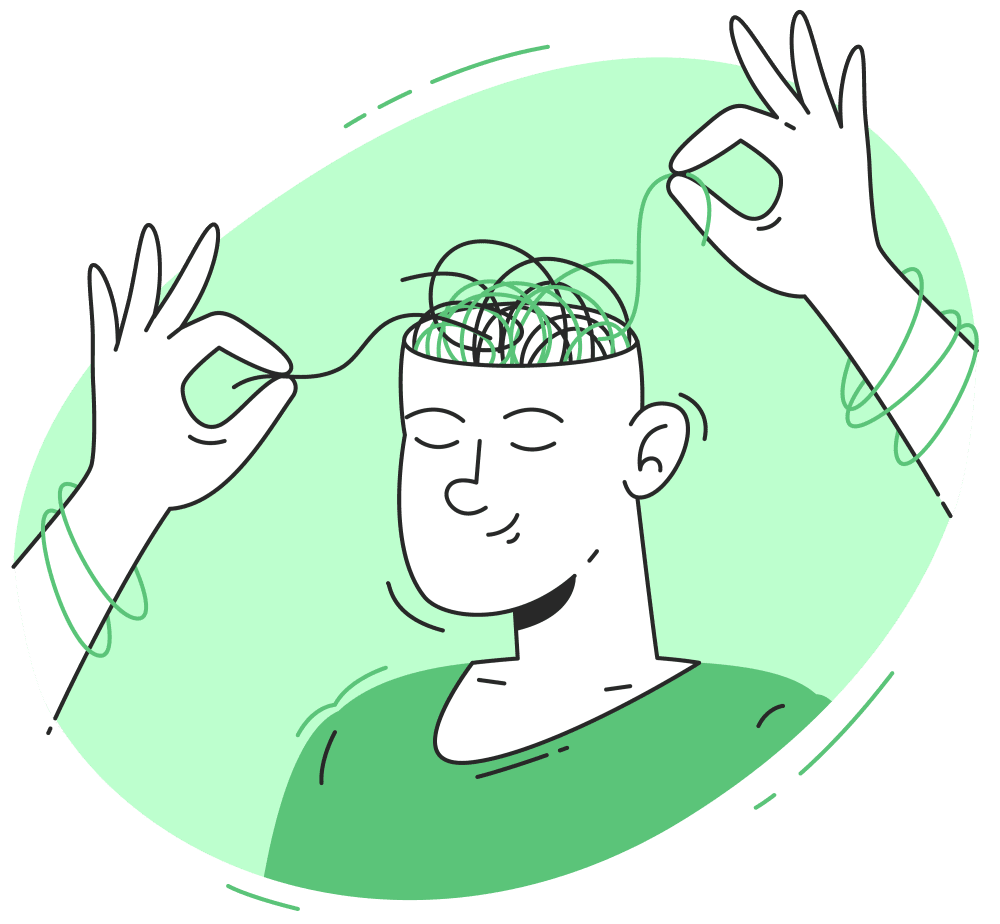Psychotherapy is often depicted in sensationalized narratives where therapists blur ethical boundaries, engage in inappropriate relationships, or employ nightmarish treatments. However, these portrayals couldn’t be farther from the truth. Psychotherapy is a deeply transformative process centred around awareness and change. It’s a therapeutic odyssey guided by trained professionals to unravel the complexities of the human mind and emotions. Psychotherapy allows individuals to explore their thoughts, feelings, and behaviours, fostering healing and enabling positive transformation. This guide will explore what therapy is and how to choose a therapist.
What is Therapy?
The American Psychological Association (APA) describes psychotherapy as a collaborative approach grounded in dialogue and communication. Therapists utilize scientifically validated procedures to help individuals develop healthier, more effective habits and positive coping strategies. Through therapy, individuals can explore their feelings, thoughts, and behaviours, gain insight into specific issues, and work towards resolving challenges. Therapists tailor their interventions to each client’s specific needs, fostering a supportive environment that promotes self-exploration and growth. By addressing psychological challenges and emotional struggles, psychotherapy empowers individuals to enhance their overall well-being and lead more fulfilling lives.
Roots of Psychotherapy

The roots of psychotherapy stretch far back into history, long before the pioneering work of Sigmund Freud. Ancient Greek philosophers such as Plato and Socrates explored the nature of the mind and emotions, laying the foundation for the importance of self-awareness and introspection. Their teachings, emphasizing examining one’s life, remain fundamental in modern psychotherapy. Additionally, Eastern philosophies contributed significantly to the understanding of the human mind. Buddha, for instance, focused on enlightenment and self-regulation, teaching the significance of mindfulness and inner peace.
Centuries later, the renowned Persian poet Rumi delved into themes of escaping pain, finding love, and embracing acceptance. His poetic wisdom inspires therapeutic approaches centred on self-compassion and emotional acceptance. In philosophy, Hegel introduced the Dialectic method, emphasizing the importance of dialogue and the resolution of contradictions. This method has influenced therapeutic practices, emphasizing the power of discourse and understanding in the therapeutic relationship.
Understanding the Heart of Psychotherapy: The Power of Dialogue
But how does therapy achieve the change we desire? The answer, in its essence, is deceptively simple: you talk, and the therapist listens. Research consistently points out that merely being able to talk about oneself has a relieving effect. It provides individuals with an opportunity to articulate their thoughts and emotions, bringing a sense of clarity and relief. However, listening in therapy is a nuanced and distinct process, different from sharing with a close friend. Therapists are trained as active and empathic listeners. Introduced by Carl Rogers, this empathic listening forms the backbone of every modern therapeutic approach.
Active Listening
Empathic listening involves more than just hearing words; it’s about understanding the underlying emotions, the unspoken pain, and the hidden fears. Therapists create a space where individuals can express their deepest vulnerabilities without judgment. Through this empathic listening, therapists help clients gain insights into their emotions and behaviours, fostering self-awareness and self-acceptance. This process of sharing and understanding within the therapeutic relationship becomes a powerful catalyst for change.

Active listening techniques are crucial in therapy. Therapists often employ methods such as labelling emotions, interpreting events, and connecting thoughts, emotions, and behaviours. Labelling emotions involves helping individuals identify and articulate their feelings, enabling them to gain better control over their emotional responses. Interpreting events and connecting thoughts, emotions, and behaviours assists individuals in understanding the underlying causes of their actions, leading to self-discovery and personal growth.
Often viewed as awkward in everyday conversations, silence becomes a valuable tool in therapy. It allows individuals the time and space to reflect, promoting deeper self-awareness. Open-ended questions encourage clients to explore their feelings and thoughts more deeply, facilitating meaningful insights. Therapists also utilize non-verbal cues, such as body language and facial expressions, to enhance communication and understanding. Additionally, therapists help clients learn to bring back attention, fostering mindfulness and self-regulation.
Moving Beyond Labels: Empowering Individuals in Therapy
Unlike early psychoanalysts and behaviourists, modern therapists, influenced by the ideas of Carl Rogers, are moving away from labelling people as patients or sick. Rogers advocated that only a person is the master of their life, emphasizing the profound importance of self-direction and autonomy. This principle is the cornerstone of contemporary therapeutic practices. Modern therapists refrain from giving life advice, such as suggesting divorce or starting a new career, recognizing that individuals are the ultimate decision-makers in their lives.
The therapist’s function is to build a strong, trusting relationship with the client and support them through their chosen goals. This approach fosters empowerment and self-determination, allowing individuals to take charge of their narratives. Evidence supporting this claim is abundant. A study by the American Psychological Association (APA) involving 300,000 people over 39 years highlighted the significance of a solid therapeutic alliance. The study revealed that a robust therapeutic relationship significantly affects people’s lives, emphasizing the transformative power of a trusting and supportive therapeutic partnership.
Choosing the Right Path: Different Schools of Therapy
When it comes to psychotherapy, there is no one-size-fits-all approach and choosing the right therapist can be a difficult task. Therapy is a deeply personal journey; different individuals resonate with different methods. Modern psychotherapy encompasses various evidence-based approaches, each rooted in unique philosophies and techniques. Here are some of the main schools of therapy, each with its history and evidence about their effectiveness in therapy.
Schools of Therapy
- Psychodynamic Therapies: From Freudian psychoanalysis, psychodynamic therapies explore unconscious thoughts and feelings to understand present behaviour. This approach emphasizes the role of early life experiences in shaping one’s personality and behaviour. Psychodynamic therapies often involve free association, dream analysis, and therapeutic relationship exploration.
- Cognitive-Behavioural Therapy (CBT): CBT is a goal-oriented therapy focusing on identifying and changing negative thought patterns and behaviours. It helps individuals recognize and challenge distorted thinking, leading to improved emotional regulation and coping skills. CBT is particularly effective in treating anxiety disorders, depression, and various phobias.
- Dialectical Behavioral Therapy (DBT): Developed by Marsha Linehan, DBT combines cognitive-behavioral techniques with mindfulness strategies. It is often used to treat borderline personality disorder and other mood disorders. DBT emphasizes acceptance and change, helping individuals manage intense emotions, improve interpersonal relationships, and develop distress tolerance skills.
- Schema Therapy: Schema therapy, developed by Jeffrey Young, focuses on identifying and addressing long-standing negative patterns or schemas developed in childhood. By challenging and changing these maladaptive schemas, individuals can overcome deep-seated emotional issues and improve their overall well-being.
- Eye Movement Desensitization and Reprocessing (EMDR): EMDR is an integrative psychotherapy approach designed to alleviate distress associated with traumatic memories. It involves guided eye movements while processing distressing memories, helping individuals reprocess traumatic experiences, reducing emotional charge, and promoting healing.
- Person-Centered Therapy: Rooted in the teachings of Carl Rogers, person-centered therapy emphasizes the therapeutic relationship and unconditional positive regard. Therapists provide a non-judgmental and empathetic environment, allowing clients to explore their feelings and experiences freely. Person-centered therapy helps individuals develop self-acceptance, self-awareness, and personal growth.
Conclusion

Choosing the right therapy often involves considering the individual’s specific concerns, personality, and preferences. Each therapy school has a substantial body of research supporting its effectiveness in treating various mental health conditions. It’s essential for individuals to work closely with mental health professionals to determine the most suitable approach tailored to their unique needs and goals.
In essence, psychotherapy stands as a testament to the resilience and potential for growth inherent in every individual. By embracing diverse therapeutic approaches, individuals can embark on a transformative journey, guided by compassionate professionals, toward self-discovery, healing, and enduring change.
Choosing the Right Therapist?
Selecting the right therapist is a deeply personal and important decision, one that can significantly influence the therapeutic process and its outcomes. While there is no definitive roadmap, considering several key factors can help individuals find a therapist who aligns with their needs and preferences.
Requirements
- Qualifications and Expertise: Ensure your therapist holds appropriate qualifications from accredited institutions. Research their background, including degrees, certifications, and specialized training in the areas relevant to your concerns. A therapist’s expertise in your specific challenges can greatly impact the effectiveness of therapy.
- Comfort and Trust: Therapy thrives on trust and openness. Feeling comfortable with your therapist is paramount. Trust your instincts; if you don’t feel a connection or sense of comfort, it might be worth exploring other options. A safe and non-judgmental environment is essential for effective therapy.
- Experience and Specialization: Consider the therapist’s experience in dealing with the issues you are facing. Experienced therapists often have a deeper understanding of various challenges and can tailor their approaches effectively. Specialization in areas like trauma, anxiety, relationships, or specific disorders can be invaluable.
- Supervision and Quality Assurance: A reputable therapist often has a supervisor or mentor who oversees their practice. Supervision ensures that therapy adheres to ethical guidelines and maintains high standards of quality. Knowing your therapist participates in supervision can provide added assurance.
- Continuous Professional Development: Therapy techniques and approaches evolve. A therapist committed to continuous professional development stays updated with the latest research and methodologies. This commitment reflects their dedication to providing the best possible care.
- Membership in Professional Bodies: Membership in a recognized professional regulatory body signifies that the therapist adheres to ethical guidelines and standards. These organizations often have codes of conduct, ensuring a high level of professionalism and accountability.
- Financial Considerations: Therapy involves a financial commitment. Consider your budget and explore options such as insurance coverage, sliding scale fees, or community mental health services. Some therapists offer a limited number of sliding scale slots based on income, making therapy more accessible.
Conclusion
It’s important to acknowledge that finding the right therapist might take time and a few initial sessions. Therapy is a collaborative effort; effective communication with your therapist about your needs, expectations, and concerns is key. Don’t hesitate to ask questions during the initial consultation. A skilled therapist will be open to discussing their approach, qualifications, and how they can assist you.
Frequently Asked Questions About Therapy: Understanding the Therapeutic Process

Therapy is often viewed as a transformative and deeply personal experience, but it also comes with its own set of questions and uncertainties. Here are some common queries people have about therapy:
Qualifications
- How do I know my therapist has the qualifications they claim to have? Therapists should have their qualifications prominently displayed in their office and readily provide their credentials upon request. You can also verify their qualifications with relevant professional organizations or regulatory bodies in your region.
Ethics
- What are the ethical guidelines for therapy? Ethical guidelines vary by country and profession, but they universally emphasize confidentiality, respect, informed consent, and maintaining professional boundaries. Therapists are bound to prioritize their clients’ well-being and adhere to these ethical principles.
Public Spaces
- Is it okay to do therapy in public spaces? Privacy is essential in therapy. Conducting sessions in public spaces can compromise confidentiality. It’s generally recommended to have therapy sessions in a private, quiet, and secure environment.
Boundaries
- What are the boundaries of therapy? Therapy boundaries are crucial for maintaining a professional relationship. These boundaries include not engaging in social activities with clients, avoiding dual relationships, and refraining from any form of exploitation or harm. Boundaries are in place to ensure a safe and respectful therapeutic environment.
Alliance
- How do I know if I have a strong therapeutic alliance with my therapist? A strong therapeutic alliance is characterized by trust, openness, and collaboration. You should feel heard, understood, and respected. Your therapist should demonstrate empathy, and you should feel comfortable discussing even challenging topics. Feeling a sense of safety and connection is a sign of a strong alliance.
Commitment
- How much time do I need for therapy to work? The duration of therapy varies widely based on individual needs and goals. Some people find relief in a few sessions, while others may benefit from longer-term therapy. Therapy effectiveness often depends on the nature of the issues being addressed and the client’s commitment to the process.
Supervision
- Is supervision mandatory for therapists? While supervision is not mandatory in all jurisdictions, it is highly encouraged and considered a best practice. Supervision provides therapists with guidance, support, and a space to reflect on their cases, ensuring the quality of therapy provided.
Confidentiality
- Will my therapist call my family? Therapists cannot contact your family or anyone else without your explicit consent, except in situations where there’s an immediate risk to your safety or the safety of others. Confidentiality is a fundamental principle in therapy.
How much does therapy cost?
- Is therapy expensive? Therapy costs vary based on factors such as location, therapist qualifications, and type of therapy. Many therapists offer sliding scale fees based on income, and health insurance often covers therapy services, making it more accessible to many individuals. It’s essential to openly discuss any concerns or questions you have about therapy with your therapist. A transparent and respectful dialogue helps establish trust and ensures that you can fully engage in the therapeutic process with confidence and peace of mind.
- Can I find affordable therapy? Yes, affordable therapy options exist. Many therapists offer sliding scale fees based on income, making therapy more accessible. Community mental health centers, university clinics, and online therapy platforms often provide cost-effective services. Additionally, insurance plans often cover therapy, reducing the financial burden on clients.
Prescriptions
- Does the therapist write prescriptions? Psychologists and counsellors, who typically offer talk therapy, do not have the authority to prescribe medication. Psychiatrists, who are medical doctors specializing in mental health, can prescribe medication. In some regions, psychiatric nurse practitioners and physician assistants can also prescribe medication.
Mistakes
- What happens if my therapist makes a mistake? Therapists, like all professionals, can make mistakes. If you believe your therapist has made an error, it’s important to address your concerns directly with them. Therapists are trained to handle such situations professionally and ethically. If you are dissatisfied with the resolution, you can contact the therapist’s licensing board or professional association to file a complaint.
Conclusion
Remember, therapy is a collaborative process, and open communication with your therapist is key. In this article, we delved into the question of what is therapy and how to choose a therapist. Asking questions, discussing concerns, and understanding the therapeutic process can help you make the most out of your therapy experience. A strong therapeutic relationship, built on trust and mutual respect, is fundamental to successful therapy outcomes.
Ready to begin? Start your online therapy journey today. Book your first session now.




